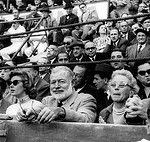The above article discusses Hemingway’s time in Cuba, self-medication perhaps with alcohol, and his love for his Cuban home. Very interesting. Best, Christine
All about Hemingway
The above article discusses Hemingway’s time in Cuba, self-medication perhaps with alcohol, and his love for his Cuban home. Very interesting. Best, Christine

As usual, Hemingway is in the news everywhere. So what’s new?
1.) There apparently is news that there is a computer program that can predict whether you or I are the next Hemingway. You can send in a sample of your writing and the computer can tell you if you are in line with his style or just another wannabe. 

We all know that there is so much more that went into his writing than on the surface. One of the prime theories that Hem put to the test was the iceberg theory. For every sentence that he wrote on the paper, there were ten that didn’t get down on the paper but that were distilled into making that one sentence. When Hemingway wrote about a waiter, he–in his head–knew the waiter’s whole history and it was his theory that by knowing that history, even though it didn’t make it to the paper and the story, it added some texture to what eventually got into the story. He wrote the ending to A Farewell to Arms thirty-nine times and he wrote the last sentence of the The Sun Also Rises “Isn’t it pretty to think so?” many, many times until it had the exact inflection he wanted. No program can take that into account. So good luck with that computer

program!
2.) The John Fitzgerald Kennedy Library has received a shipment of new documents that it has added to its Hemingway collection. One that is particularly interesting is the telegram by which Hem was advised that he’d won the Nobel Prize for literature. It was sent to him on October 28, 1954 at 11:00 a.m. It said:
At its session today the Swedish Academy decided to award you the 1954 Nobel Prize for literature and I would accordingly request you to notify me if you accept this award and whether in that case it would be possible for you to be present in Stockholm on Nobel Bay December 10 to receive the prize from the hands of His Majesty the King. Anders Obersterling, Permanent Secretary of the Swedish Academy, 7:00 p.m.
Hemingway was not in good enough health to go to Sweden. He’d just survived two plane crashes in Africa and, while he put on a brave face, the second crash left him impaired for life with pain that never went away. He wrote a brief statement that was read by John C. Cabot, the then U.S. Ambassador to Sweden.
While Hemingway told the press that Carl Sandburg, Isak Dinesen, and Bernard Berenson were far more deserving of the honor, but he could use the prize money so he accepted, I have to believe he was pleased. He should have won it for For Whom the Bell Tolls and fortunately he won it eventually for The Old Man and the Sea.
It’s wonderful to listen to him making the speech, which he made after the fact and recorded. The beginning of it goes as follows:
“Having no facility for speech making and no command of oratory nor any domination of rhetoric, I wish to thank the administrators of the generosity of Alfred Nobel for this prize.
No writer who knows the great writers who did not receive the price can accept it other than with humility. There is no need to list these writers. Everyone here may make his own list according to his knowledge and conscience….Writing, at best, is a lonely life. Organizations for writers palliate the writer’s loneliness, but I doubt if they improve his writing. He grows in public stature as he sheds his loneliness and often his work deteriorates. For he does his work alone and if he is a good enough writer, he must face eternity, or lack of it, each day….I have spoken too long for a writer. A writer should write what he has to say and not speak it. Again, I thank you.”
At his best, he was an amazing class act.